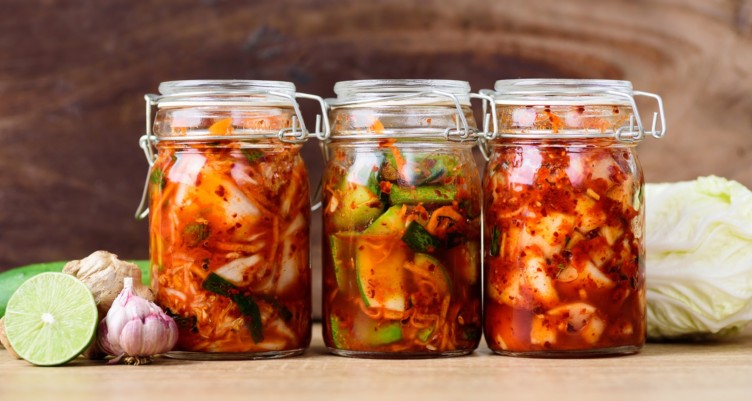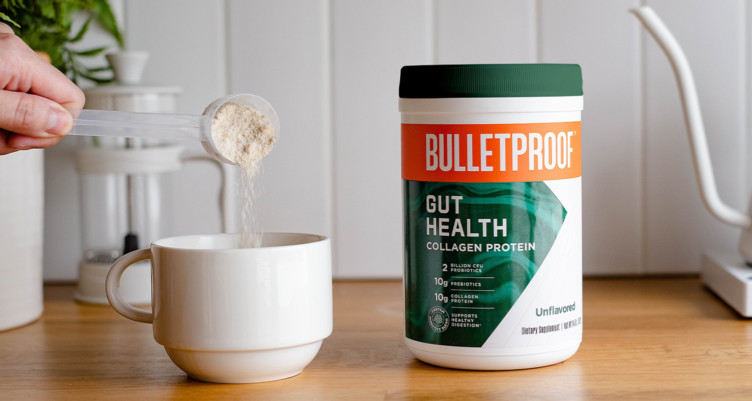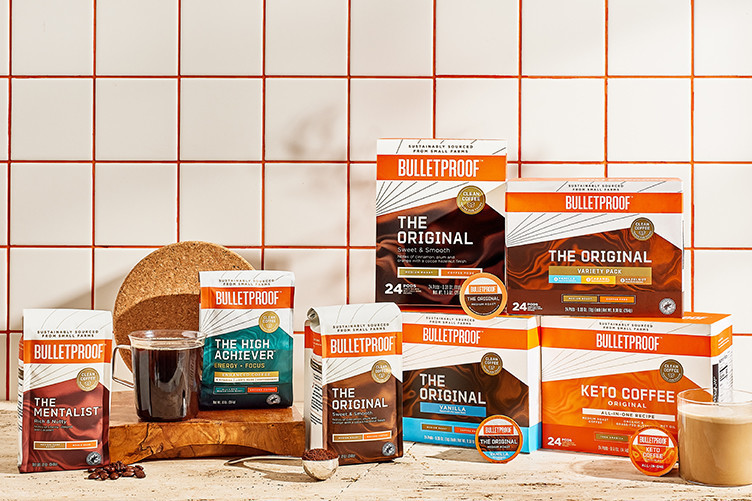Gut Health & Sleep: 6 Ways to Support Your Microbiome for Better Rest

- Maintaining a healthy gut microbiome is critical not just for optimal digestion, but also for quality sleep.
- Eating prebiotic and probiotic foods and using targeted supplements will help support your gut health, and ultimately, better rest.
- Discover the different (and easy!) ways you can support your microbiome.
While the state of your gut microbiome massively impacts digestion, it also plays a significant role in the quality of your sleep. Luckily, there are a few easy ways to support optimal gut health, and by extension, better sleep.
From foods to put on your plate to supplements to include in your stack, we’ll provide you (and your gut) with some guidance on how to get things moving in the right direction.
How gut health affects sleep

Everyone needs high-quality sleep for optimal performance and overall health. Of course, there are many factors that impact how well-rested we feel in the morning. One of the most overlooked ones happens to be what’s going on in your gut.
In fact, your gut microbiome can either set you up for a good night’s sleep or inhibit your ability to do so. Research shows that total microbiome diversity is positively correlated with increased sleep efficiency and total sleep time. In addition, it’s also positively associated with interleukin-6, a cytokine that’s associated with sleep quality.[1]
Translation: The relationship between gut health and sleep makes it critical for you to take care of your microbiome.
6 Ways to Support Your Microbiome for better rest

Ready for a better night’s rest? Here are six ways to show your microbiome some love and support quality sleep.
1. Eat prebiotic and probiotic foods
Spoiler alert: What’s on your plate (or in your cup) can either help or hinder your gut health. While fried foods and alcohol definitely don’t support your microbiome, prebiotic and probiotic foods certainly do, and including them in your diet will provide the building blocks for healthy digestion.
Want serious prebiotic bang for your buck? Include the Jerusalem artichoke on your shopping list. Part of the sunflower family, this starchier veggie is used to source inulin—a fiber that’s indigestible for humans but full of prebiotics for your gut bacteria. Consuming the Jerusalem artichoke improves the growth of beneficial bacteria and promotes better digestive health.[2]
As for sources of probiotics? Plain yogurt and fermented foods like kimchi, sauerkraut and kombucha will also support your microbiome. The fermentation process adds beneficial bacteria that your digestive system will surely appreciate.
Related: 6 of the Worst Foods for Gut Health
2. Gut health supplements

In addition to eating the right foods, you can give your microbiome a boost via supplements. From a prebiotic that helps strengthen your immune response to a probiotic that provides fast and sustained fuel for your gut, here are our favorites:
- Bulletproof InnerFuel Prebiotic: This unflavored supplement nourishes good gut bacteria, supports healthy digestion and boosts immunity.† Made with plant-based prebiotics, including acacia gum, partially hydrolyzed guar gum and Larch arabinogalactan, it mixes easily into any beverage. Use it to upgrade your morning Bulletproof Coffee or add it to a smoothie for gut health support.†
- Bulletproof Gut Health Collagen Protein: Tap into collagen protein, prebiotics, probiotics and a Custom Digestive Blend with this versatile supplement. Like InnerFuel Prebiotic, Gut Health Collagen Protein is unflavored, so you can enjoy its benefits in just about any way you want. Not only will your digestive system benefit from key ingredients like glycine and zinc carnosine, but your bones, muscles and joints will benefit from grass-fed collagen protein.†
- Bulletproof Express 3-in-1 Probiotic: Looking to optimize your gut health? Express 3-in-1 Probiotic delivers a science-backed postbiotic for fast and sustained fuel for the gut. Plus, it contains probiotics and prebiotics that provide long-term support for good gut bacteria.†
3. Manage stress
While we can’t completely avoid stress, we can—and should—manage it. And when it comes to both your gut health and sleep quality, it’s important to find positive ways to deal with whatever stressors are present in your life.
After all, your brain and gut are tied together through the enteric nervous system, and if you’re stressed, it can cause communication issues in the gut-brain axis that can impact your digestion.[3] And anyone who’s had a stressful day can sympathize with the issue of sleepless nights.
Achieving mind-body balance can be done in a number of ways. Yoga or meditation can bring inner peace and perspective. Journaling can provide a pathway to express your thoughts and feelings. Even going for a 30-minute walk while listening to a podcast can unburden your mind. Ultimately, you’ll be doing your microbiome a service by managing stress, and better gut health should lead to better sleep, too.
Pro Tip: Support your body’s ability to stay balanced by taking a supplement for stress relief like Zen Mode. Formulated with ashwagandha, magnesium citrate, GABA and our Custom Stress Blend, it can help you feel calm and centered.†
4. Exercise regularly

Need extra motivation to get moving? Not only can you sleep and manage stress better with exercise, but you can also improve your gut health.
Research shows that exercise can determine changes in the composition of your gut microbiome. Besides enriching the diversity of the microflora, it also stimulates the proliferation of bacteria that can modulate mucosal immunity.[4]
To break it down, exercise is good for your good gut bacteria—and sleep.
Related: The Ultimate Bulletproof Guide to Fitness, Exercise Supplements and Recovery
5. Intermittent fasting
The simplest way to support your microbiome? Don’t eat. Intermittent fasting is beneficial for both weight management and ketone production, as well as your gut health.
A study conducted on 16 individuals found that water fasting drastically changed the bacterial community, resulting in fewer microbial species that are known to be detrimental. [5] Fasting also gives your digestive system a break, and it requires zero effort. And since there are many different types of fasting protocols, you can experiment to find what works best for you. If you are considering a longer fast, make sure to break it with foods that are gentle on the gut.
6. Get polyphenols in your diet

Polyphenols are organic compounds found in plants that offer various health benefits. In particular, they have a major impact on your gut microbiota.
Research shows dietary polyphenols and their metabolites stimulate the growth of beneficial bacteria and the inhibition of pathogen bacteria.[6] As for food sources? Dark chocolate, green tea and coffee are Bulletproof-friendly sources of polyphenols you can include in your diet on a daily basis to support better gut health. However, because of the stimulating effects of caffeine, it’s best to have these polyphenol-rich items earlier in the day.
The bottom line: Taking care of your gut will go a long way toward achieving better rest. Most importantly, you need to feed your microbiome the right nutrients. And beyond consuming prebiotic and probiotic foods and supplements, you can set yourself up for success by managing stress and implementing fasting. Put in the work during the day to optimize your gut health and you should be able to sleep more soundly at night.
Prebiotics and probiotics aren’t the only components that make up a healthy microbiome. Discover how postbiotics play an integral role in your gut health.
Sign up for early access to sales, product launches, the latest Bulletproof news and more!



